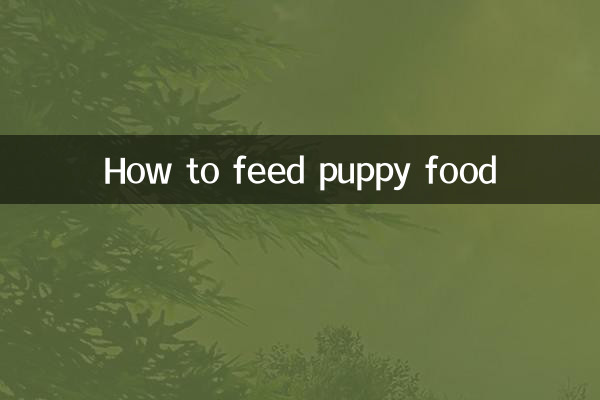How to Feed Puppy Food: Scientific Feeding Guide
In the past 10 days, the hot topic about pet feeding has continued to heat up, especially how to scientifically feed puppy food has become the focus of pet owners. The correct feeding method can not only ensure the healthy growth of dogs, but also prevent various digestive system diseases. This article will combine the latest hot spots on the Internet to provide you with a detailed analysis of the feeding methods of puppy food, and provide structured data for your reference.
1. The relationship between dog age and feeding frequency

Dogs of different ages have different nutritional needs and digestive abilities, so the feeding frequency needs to be adjusted accordingly. Here are the recommended feeding frequencies for dogs of all ages:
| age stage | Feeding times |
|---|---|
| 2-3 months | 4-5 times a day |
| 3-6 months | 3-4 times a day |
| 6-12 months | 2-3 times a day |
| 1 year old and above | 1-2 times a day |
2. Dog food selection criteria
Recent pet food industry reports indicate that high-quality dog food should have the following characteristics: high in protein, no artificial additives, and rich in essential vitamins and minerals. Depending on the size and age of the dog, the choice of dog food needs to be different.
| Dog food type | Applicable objects | Features |
|---|---|---|
| puppy food | 2-12 months | High protein, easy to digest |
| adult dog food | 1-7 years old | Balanced nutrition |
| Senior dog food | 7 years and above | Low fat, joint care |
| small dog food | Weight <10kg | Small particles, high heat |
| large dog food | Weight>25kg | joint protection formula |
3. Feeding amount calculation guide
According to the latest statistics, about 65% of pet owners have improper feeding problems. The correct feeding amount should be calculated based on the dog's weight, activity level and dog food calories. The following are reference feeding amounts based on body weight:
| Weight range(kg) | Daily feeding amount (g) |
|---|---|
| 1-5 | 35-100 |
| 5-10 | 100-180 |
| 10-20 | 180-300 |
| 20-30 | 300-400 |
| 30-40 | 400-500 |
4. Common feeding misunderstandings
Recent discussions on social media about dog feeding have revealed several common myths:
1.Feel free to change dog food brands: A sudden change of dog food may cause indigestion, so the transition should be gradual.
2.Feeding humans food: Many human foods are harmful to dogs, such as chocolate, onions, etc.
3.Overfeeding snacks: Snacks should not exceed 10% of total daily calories.
4.Neglecting drinking water management: Fresh and clean drinking water should be readily available.
5. Handling of special situations
1.Picky eating problem: You can try eating small amounts more often, increasing the amount of exercise, or changing to more palatable dog food.
2.obesity problem: Feeding should be reduced, low-fat dog food should be used, and exercise should be increased.
3.Sensitive gastrointestinal: Choose dog food with easily digestible formula and consult your veterinarian if necessary.
6. Suggestions on feeding time arrangements
Regular feeding helps establish the dog’s biological clock and promotes digestion and absorption. The following is the recommended feeding schedule:
| Feeding times | Recommended time |
|---|---|
| 4 times/day | 7:00, 11:00, 15:00, 19:00 |
| 3 times/day | 7:00, 12:00, 18:00 |
| 2 times/day | 7:00, 18:00 |
7. The correct way to change food
According to the advice of pet nutrition experts, food changes should follow the 7-day transition rule:
| days | Ratio of old grain | New grain ratio |
|---|---|---|
| Day 1-2 | 75% | 25% |
| Day 3-4 | 50% | 50% |
| Day 5-6 | 25% | 75% |
| Day 7 | 0% | 100% |
Scientific feeding is the basis for ensuring the healthy growth of dogs. By understanding your dog's nutritional needs, choosing the right dog food, and mastering the correct feeding methods, you can provide your dog with the best quality of life. Remember to regularly observe your dog’s weight changes and bowel movements, and adjust the feeding plan in a timely manner. If you have special health problems, please consult a professional veterinarian in time.

check the details

check the details